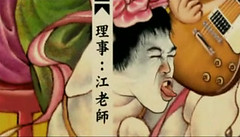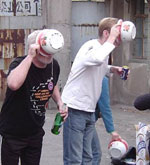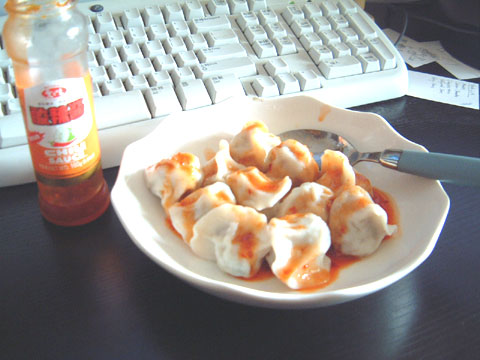31
Oct 2005Simon's Halloween Treat
“Superhuman Linking Machine” Simon of Simon World has recently put together a Halloween treat for you. You won’t need a costume to join the fun. You don’t have to go door to door and beg for it. You don’t have to scoop out pumpkin innards or create fire hazards in the name of tradition…
It’s the Simon World’s Top Ten List on the China Blog List “Recommended” page!
Happy Halloween.
30
Oct 2005Snobbery, Guilt, and Good Will
I admitted to Micah the other day that he was a part of the inspiration for the 老百姓 snob I wrote about recently. I didn’t mean it as an insult or anything… it was just an observation of his lifestyle in Shanghai.
Micah recently responded:
But let me say a few words in defense of the 老百姓 snob. I think the reason I put forward the effort to be this kind of snob is because I reject the status boost I might get from the stereotypes that Chinese hold about Western folk: they’re educated, creative, high-flying, party hard, and come to take charge. Consequently, I have to actively try to frame myself back into the same “social status” that I would have had back at home: just your average college graduate working his way into the middle class, feeling out of place in places like Rodeo Drive in Hollywood, considering his pocketbook when he dines out, and still having a warm spot in his heart for the street food and home-cooking of his youth. It’s not that the 老百姓 snob is absurd, it’s that he’s more sensitive to taking advantage of people thinking he’s something he’s not.
Not that I don’t realize I’m different; I will take advantage of being a foreigner abroad by taking English-teaching or translating jobs, but taking a higher salary just because I have a white face is something that weighs on my conscience. Maybe a useful metric to live by would be, if I was an immigrant from Nigeria would I have this option (of taking this higher salary, being invited to this party, being asked to take part in the filming of this commercial)?
On the one hand I kind of admire Micah’s stance. I, too, have felt the sort of “guilt of the privileged” on many occasions while living in China. I see it differently, though.
(more…)29
Oct 2005White Bear
Imagine a Klondike Bar without the chocolate shell. Just a nice thick square of vanilla ice cream. That’s basically what White Bear (白熊) Ice Cream is.
The picture shows a spoon, but who needs that? The wrappered slab of vanilla fits in your hand comfortably, no utensil required. The ice cream is pretty good… rather creamy for a Chinese brand. It costs 5 rmb. I think I still prefer 大块头 ice cream at only 1 rmb, but I don’t have a scan for that.

Apparently in Chinese you can say either 白熊 (literally, “white bear”) or 北极熊 (literally, “North Pole bear”) for “polar bear.” My dictionaries don’t indicate a distinction between the two terms. Based on my own experience, 北极熊 is more common, but I can’t say I’ve really had many conversations about arctic animals in Chinese.
28
Oct 2005The Baidu Super-Wide Ad
Since Google launched the Google Ads program, website design has been seriously affected. The question of “where will I put the Google Ads in my layout?” has become an important one. I’ll admit that I, too, made this a significant factor in my own redesign of this blog.
There has been a buzz for a while about Baidu starting an ad program similar to Google’s. What I’ve noticed in the past few weeks is not directly related, though… it’s the 990 pixel wide by 60 pixel high Flash ads that appear on Baidu News. There are currently no ads on the Google News front page. (The Baidu News ad is positioned at the bottom of the screenshot below.)
As I see it, these ads represent a clear departure from Google’s strategy. The ads are so large that they span the entire width of the screen, but they resize smoothly (using the fluid flash technique?) to fit 800 by 600 monitor resolution. Google’s ads are simply small (and sized absolutely), so they work at any resolution. Furthermore, Baidu’s ads are Flash, the antithesis of Google’s largely text-based ads.
It’s interesting to see Baidu leaving Google’s well-worn path occasionally and charting some new territory.
P.S. The ad is for 蒙牛 milk, which is the same company that sponsored the “Supergirl” show.
27
Oct 2005Those Shanghai Laowai…
The page features various articles on what foreigners are up to, and two pictorials. One is a gallery of foreigners fixing bikes (and it’s every bit as fascinating as it sounds!). The other is a smaller gallery of foreigners drinking beer out of traditional Chinese vessels called 痰盂. The dictionary says a 痰盂 is a spittoon, and the characters that make up the word seem to indicate this is well. According to a Chinese source, however, these 痰盂 were frequently used in the past as a “port-a-potty.” In other words, they housed not only phlegm, but also human waste. My source told me that for a Chinese person, seeing someone drink out of one of these things causes automatic feelings of revulsion, “even if they were actually brand new,” never having been actually used for their intended purposes. I pointed out that particularly in picture three, the bottoms of the 痰盂 clearly show some wear; they don’t look brand new at all.
Shanghai Online, a Chinese internet portal site, recently did a special on Shanghai’s laowai.
[The chamber pot chuggers belong to a “drink and run” club called the Hash House Harriers. The Shanghai chapter has a website if you’re interested in joining.]
Hmmm, so what image of laowai is Shanghai Online trying to portray…?
Update: Bingfeng already blogged about the beer chuggers, way back in May! That’s what I get for not reading more than a handful of other blogs, I guess…
26
Oct 2005scRambler on Shanghai
scRambler recently put together a page on Shanghai. It’s loaded with all the sites he likes related to this crazy city. That’s cool in itself, but what makes the page especially intresting to me is that it uses MagpieRSS to pull in info from RSS feeds and then hides most of it, giving users the option to view it with a visibility toggle script. I was thinking of using a similar method for something of my own, so it’s good to see it in action first, and to know where to get the necessary components.
It just so happens that the latest version of MagpieRSS is also probably the best solution to Matthew’s question about how to display the latest additions to the CBL on one’s own blog. When I get a chance I’ll try to add a how-to to the CBL, but I’m too busy with work and school right now.
25
Oct 2005Back Dorm Boys
OK, I said I was taking a break, but this is too funny not to share…
Thanks to Tian for giving me the heads up. Tian has also collected a lot of this talented duo’s videos on his blog. They really are called the “Back Dorm Boys” (后舍男生). Take a look.
P.S. That is definitely an authentic Chinese boys’ dorm, right down to the roommate playing CS!
24
Oct 2005ChinaBlogList.org
New CBL logo
John B and I put in quite a lot of work over the weekend, and the new version of the China Blog List is now mostly complete, up and running on its own domain. John really did a great job on the new functionality, and I’m very grateful for all the programming hours he put into the project. I focused on the design and organization of the new site.
After putting all that work into the new site, I’d like to take a post to not so subtly call attention to its multifarious awesomeness.
First of all is the hierarchical geographical labels. I’ll quote the CBL Help section here:
> Having a very specific location for each blog is useful because the location filter is hierarchical. A blog listed as based in San Francisco, for example, will show up in the listings for (1) All locations, (2) Outside China, (3) USA, (4) California, and (5) San Francisco. A blog listed as based in Hangzhou will show up in the listings for (1) All locations, (2) Greater China, (3) mainland China, (4) Zhejiang, and (5) Hangzhou. Including the specific location of each blog is to that blog’s benefit.
You can filter the blog listings by location on any level of the hierarchy.
Categories have also been added. To prevent abuse, no blog can claim more than three categories, but I think it could prove very useful for filtering purposes. I have added categories myself to a lot of blogs, but there are just too many; I’m hoping blog owners will submit blog corrections telling me which three categories they would like their blogs listed under.
Traditional methods of sorting are still there, as well as sorting by “date added.” This is great if you want to see, for example, the latest Shanghai blogs or the latest Beijing blogs. Confine it to a specific category, if you want. Simple.
Blog listings are now paginated, and the user can specify the number of listings per page.
You can also use the map feature to filter blogs. It’s not especially useful, but I made it in Flash, and it looks pretty cool. You could use the map to quiz yourself on the locations of Chinese provinces, if you were that bored.
On the front page you will see that there is now a popularity ranking based on clickthroughs. Clicks are limited to one per day per IP, and there are security measures in place. But that’s not the only “Top Ten” list you’ll find…
All new to the list is two additional ways of getting China bloggers more involved in the CBL: China Blog Reviews and China bloggers’ Top Ten Lists. The CBL itself remains neutral, but it hosts the opinions of other bloggers in these two forms. (Currently you’ll find the top ten lists of Dan Washburn, Peking Duck, and me. More soon.) Both the reviews and the top ten lists give China bloggers a way to simultaneously promote other blogs as well as their own.
Last but not least, the dead blogs have been removed. If your China blog was down over the weekend for whatever reason, it’s no longer in the CBL. An astounding 30-40% of the blogs in the CBL were dead. Wow. We have a plan for keeping it from getting that bad again. (There are also some other features planned that are not yet ready.)
The design is intentionally minimalist. I can’t believe I managed to only use one image and two flash files for the whole site. I’m not satisfied with it yet, though… I’ll be tweaking it some more later.
Anyway, now is a better time than ever to use the CBL. The blogs in it are all essentially current, and there’s lots of new functionality. There will be a new wave of additions soon. ChinaBlogList.org is the new URL.
I need a break from all this computer mumbo jumbo. Posts will resume in a few days.
21
Oct 2005The M&M
While I used to live in Hangzhou, I made the observation that Chinese people seemed to have an unreasonable fear of germs. True, China is not always the most sanitary place on earth, and there’s no question that many Chinese germs live out a blissful existence where antibacterial disenfectants are restricted to germ horror stories. Still, I felt that the germ threat was overplayed in a lot of cases. I will offer but one example.
One time before class started, I was eating a little bag of M&M’s and casually eavesdropping on my students’ conversations. I overheard an exchange about germs, and it prompted me to ask my class the following question:
“What if I were to take one of these M&Ms and allow it to drop to the ground — a place that looks clean — and then pick up that same M&M, dust it off, and eat it? What would be the chance that I would then get sick from eating that M&M?”
My students gaped in shock at the mere suggestion. They required prodding to take the question seriously enough to actually answer it. What would be the probability, from 0% to 100%?
I started getting some answers. 80%, one said. 90%. Even 99%. One or two students ventured as low as 40% or so. I couldn’t believe it.
They laughed at me when I told them I thought the chance was less than 5%. I was really tempted to drop an M&M and eat it right there in front of them to prove my point, but that didn’t seem like a very teacherly thing to do. Plus, if I did, by chance, catch a cold (it was early winter), I would never live that down.
For a nation of people that believes in Chinese medicine’s power to boost the body’s natural defenses, I would think they would have a little more faith in the human immune system.
Or maybe they just knew way better than I what had been on that floor…
20
Oct 2005LTK video
No one seems to understand why I regularly check out Screenhead‘s offerings. It’s because I occasionally find really good stuff there! I’m not sure if this qualifies as “really good,” but it’s Chinese and it’s interesting.

LTK video
The video is by LTK Commune, “a well-known Taiwanese ‘underground’ band founded in 1990. Their music has been variously described as having elements of punk, rock, nakasi, Taiwanese folk songs. In recent years band members have self-consciously applied the label ‘Taik’ (from Taiwanese + -k ending, as in punk, rock) to their music – a reference to the Taiwanese Taike (Trad.: 台客) subculture.”
I gotta admit, I kinda like the sound. I can’t understand Taiwanese, and I’m too lazy to try to make sense of the subtitles, but I like the sound. I would be interested in hearing more. The video (Quicktime required) is cleverly done as well.
Warning: video contains scenes of light-hearted softcore sodomy. (no joke)
19
Oct 2005New CBL around the corner…
The new China Blog List will be finished pretty soon. John B has done some amazing work, starting from scratch, and the new version will be way better than the current one. I’ve known for some time now that the burgeoning CBL is decreasingly user friendly. The new version will change all that.
I’m not going to spell out all the new features at this point, but I will say this: during the switchover there will be a lot of deletions of dead (resting?) blogs. The China Blog List will stop listing “no longer updated blogs.” I’m going with the definition of blog which includes “frequently updated,” so anything that hasn’t been updated in the past three months or so gets axed. That means if you use any of those links, get them while they’re still there.
New submissions have been suspended until the switchover is complete. Thanks for your patience.
18
Oct 2005Snobs in China
When I lived in Hangzhou, the “snobs” were the foreigners that lived in Shanghai and thought it was so great.
After I moved to Shanghai, the “snobs” became the foreigners in Shanghai that didn’t learn any Chinese and spent all their time and money in Western over-priced restuarants and bars.
Carl helped me realize how “snobby” I can be, towards foreigners that spend a lot of time in the bar scene (some actually are cool). They’re not all assholes.
There are so many kinds of snobs, really. (Maybe it cheapens the term to apply it so liberally, but who cares?) When I still lived in the US the ones that annoyed me the most were the music snobs. Here in China (and especially in Shanghai), there are so many other kinds of snobs to be found in the expat community…
- There are the “Real China snobs”. Their experience in China is the real one, in some part of China that the snob deems respectably “rough.” This type of snob holds nothing but contempt for the expats in Shanghai. The funny thing, is, you can find this type of snob in Hangzhou. (Life in Hangzhou is anything but “roughing it.”)
- There are the “Chinese study snobs”. They’re usually bookish and don’t openly show contempt. But they might mention that they don’t hang out with foreigners.
- There are the “I speak Chinese snobs”. They speak at least basic Chinese, and unlike the “Chinese study” snobs they do hang out with foreigners, mostly because they’re always trying to impress them with their Chinese skills. Their snobbery is only half-hearted, because they love to be needed by those without the Chinese skills. They limit their contempt for the Chinese-unequipped to occasional snide remarks.
- There are the “I am so 老百姓 snobs”. These are the opposite of the traditional snobs. They arrive in China and move right into the slums to live with their Chinese “brethren.” They get 5 rmb haircuts and eat 5-10 rmb meals, exclusively Chinese. They usually don’t show a lot of contempt for those who want normal conveniences, but neither do they recognize the absurdity of their own actions. This kind of snob is specific to big cities, but is otherwise basically the same as the “Real China” snob.
I am guessing that some of my readers find me writing about this ironic, as on more than one occasion I have been accused of being one of these types. So here’s where I’ll get honest.
I was certainly never hardcore about it, but I did feel the “Real China snob” in me resisting the move to Shanghai. I lived out my “Real China” snob fantasies in my first year in Hangzhou and when I traveled in my first 2-3 years in China.
I was sort of a “Chinese study snob” my first year in China, but that was mostly because I was poor and didn’t really know any other foreigners. I’ll admit that I am still somewhat bewildered (frustrated? shamed? saddened?) by foreigners who live in Shanghai long-term and don’t make a real effort to learn the language. I’m not sure if that makes me a snob.
Despite the occasional accusation, I don’t think I am a “I speak Chinese snob,” although certain friends of mine might say I have definitely exhibited symptoms. (It was tough love, I swear!) But yes, I speak Chinese, and not badly. If you want to label me a snob for that, have fun.
I am not a “I am so 老百姓 snob,” but I think I know a few people who exhibit symptoms.
So… how many kinds of snobs did I miss? What kind of snob are you?

17
Oct 2005Unflattering DVD Covers
I’ve talked about funny examples of pirated DVDs’ English subtitles and funny examples of pirated DVDs’ Chinese subtitles. These are both pretty commonplace in China. Another source of pirated DVD amusement is the actual DVD jacket the pirates create to sell the movies on the streets.
In many cases the pirates do an extremely professional job, creating either an almost exact replica of the official release, or an original design which is hardly inferior to the official DVD release’s case design. However, it is also not unusual to find DVD jackets with English text thrown on for appearance only (why would Chinese customers care if the English synopsis is totally wrong?). This happens most often when the DVD jacket is created way before the DVD’s official release. This can have hilarious results. I once saw an English synopsis on the back of a pirated DVD jacket that looked something like this: “Sfhtmcp hirncoae nsf doijwp sd dgv pmayq icbs ht yfksbn gxksmzbnc hfjr oisjgf tcwtq nsiv cpsj Fxhstr utn vgbgj doivpb mndlc jvnbh dyr.” You get the idea. The more “professional” pirates often turn to movie reviews on the IMDb. Sometimes they choose less than favorable reviews to display prominently on the DVD jackets, however.
Below is just one example of this phenomenon. Note the quotes on the front at the bottom, and at top right (in red) on the back.
The movie’s full title is Dungeons & Dragons: Wrath of the Dragon God. In case there is any doubt, it is indeed a horrible movie. I got through about 20 minutes of it before I turned it off. (Someone gave it to me!)
More: There’s a Flickr group called Crappy Bootleg DVD Covers with more of the same (although not all necessarily funny).
Related: If you liked the crazy English subtitles, a blog called Middle Kingdom Stories has made it a regular feature. Check it out: Crazy subtitles. I still think the original Backstroke of the West was the funniest, though.
14
Oct 2005Characters and Shapes
One of the fun things about studying a foreign language is learning the new angle from which that language approaches the world. Part of that angle is a language’s orthography. Below are a few differences of how the English language names shapes (using letters) compared to how Chinese names those shapes (using Chinese characters).
- What shape do migrating ducks fly in?
- English: a V-shape
- Chinese: 人字形 (a “人 character” shape; “人” means “person”)
- What is the symbol of Christianity?
- English: the cross
- Chinese: 十字架 (a “十 character” frame/rack; “十” means “ten”)
- What do you call an intersection of two perpendicular streets?
- English: crossroads
- Chinese: 十字路口 (a “十 character” intersection; “十” means “ten”)
- What do you call a street which ends at another street at a perpendicular angle?
- English: a “T,” a T-junction
- Chinese: 丁字路口 (a “丁 character” intersection; “丁” has a somewhat obscure meaning, but it originally meant “nail”)
- What do you call a street which diverges into two streets?
- English: a “Y,” a fork
- Chinese: 丫字路口 (a “丫 character” intersection; “丫” means “fork”)
Of the types of intersections, 十字路口 is the most common, and 丫字路口 is by far the least common (a Google search confirms this).
I’m sure there are more of these orthographically based shape descriptors, but I can’t think of any more at the moment. If you can, please chime in in the comments.
13
Oct 2005Offensive Laowai T-shirts
Chinawhite recently linked to some t-shirts for laowai in China.
Some of the shirts are mildly amusing. I wouldn’t wear any of them. The shirts feature such phrases (in Chinese) as:
– Here comes a laowai. There goes the laowai.
– Too expensive!
– I’m not a laowai, I’m a “foreigner.” [more on this issue]
– I don’t want a watch. I don’t want DVDs. I don’t want a bag.
– I will never give you any money. [in weird grammar]
– Don’t think that just because I’m a foreigner I’ll buy your stuff for 5 times the normal price.
I don’t find the shirts themselves very interesting, although I certainly understand the “inspiration” behind the shirts. What is interesting is the Chinese reaction to the shirts. There’s a fairly famous example of a foreigner causing a bit of a ruckus in Nanjing with a t-shirt listing rules for how the Chinese should interact with a foreigner. In that case “the people of Nanjing were angered because, reading between the lines of the T-shirt message, they saw a message of unwarranted arrogance and white supremacy. ” Obviously the messages above have the potential to piss off the Chinese as well.
I’m not one to wear t-shirts designed to provoke anger or outrage. Still, if you want to buy one of those shirts (mainly one of the latter three) and wear it around China, I’d be very interested to hear what kind of reaction you got.
Note: I have already posted an entry about this entitled 老外的T袖衫 in my Chinese blog, asking my Chinese readers what they think. I may write a future post about their responses.
12
Oct 2005Dumplings for Lunch
I really need to to stop eating dumplings for lunch every day. Why are frozen dumplings so good? I boil them and put some hot and sour sauce on them. (The sauce is called 酸辣酱, by a company called “爱之味.”) Yum.
I’ve been told by Chinese people that dumplings are considered something of a traditional Chinese junk food. They’re not super healthy. (So I take a vitamin when I eat them.) If dumplings are China’s attempt at junk food, though, Americans sure bested them in that department. Not only does our junk food have zero nutritional value, it’s also extremely bad for you. (Go USA!)
So the reason I keep eating dumplings for lunch is that I’ve been really busy lately, and we no longer have Ayi to cook for us. The reason we no longer have Ayi is both simple and complex. The simple reason is that now that I’ve started school I have a new part-time job that requires me to be elsewhere every weeknight, and my roommate works late pretty much every night. I might go into the complex reason in a future post, but it’s sort of a story without an ending…
12
Oct 2005老外的T袖衫
最近找到一些住在上海的外国人做的T袖衫。请先看一看(点图片可以放大)再读下去。
我想说的主要是这四件:
1. 太贵了!
2. 我不要手表。我不要DVD。我不要皮包。
3. 我永远不会给钱你。
4. 不要以为我是外国人,我会以高于正常价钱的5倍买你的东西
虽然我懂这些住在上海的外国人的感受,但是我觉得穿这样的T袖衫肯定没有好的结果。(在南京曾经有这样的事件。)
我想问我的中国读者:
– 你们中国人对这些T袖衫有什么看法?
– 如果在路上看到一个外国人穿这样的T袖衫你会生气吗?
– 你会向他说什么吗?
– 如果穿T袖衫的人是中国人呢?
11
Oct 2005Dubbing transsexuals
Danwei.org did a post on the “transsexual blogfest” almost two years ago. Why, then, does it still feel like transsexuals are all the rage here in China?
Last week I caught Korean transsexual superstar Harisu in China on TV doing some kind of Chinese gameshow. They just kept showering her with comments the whole time, going on and on about how pretty, sexy, and feminine she is. I wanted to hear her voice. I was curious what it would sound like. Unfortunately, they were doing this simultaneous interpretation thing, and Harisu’s voice was dubbed over in a female Chinese voice for the broadcast. (Harisu’s voice was just barely audible in the background, too soft to hear clearly.)
Then on Saturday a Western documentary on transsexuals was aired on Chinese TV. It was dubbed in Chinese, and a good source of vocabulary. The words 变性人 (transsexual) and 生殖器 (reproductive organs) got drilled into familiarity.
What I found most interesting were the voices used to dub the transsexuals featured in the documentary. In every case, the “transmen” were dubbed by women affecting a deep voice, and the “transwomen” were dubbed by men affecting high, feminine voices. One of the transwomen looked like a completely normal woman, and one of the transmen looked very masculine — you would never have pegged him for someone who had had a sex change. And yet they still got stuck with these voices in the Chinese dub. I couldn’t hear how their real voices sounded, so I don’t know how well the dubbing reflected the original voices.
I wouldn’t have expected the transsexuals in the documentary to be dubbed that way because Harisu was dubbed in a female voice, and the Chinese media in general seems very accepting/supportive of transsexuals. To me, using the feminine voice to dub Harisu sent a subtle “she is completely feminine” message, while the voices used in the documentary sent a subtle “they can never be the gender they’re trying so hard to be” message.
I’m always surprised by how many Chinese guys admit that they find Harisu beautiful/hot on these TV shows. I think homophobia would prevent the majority of American men from making any such public admission.
So, transsexuals in China… still hot!






